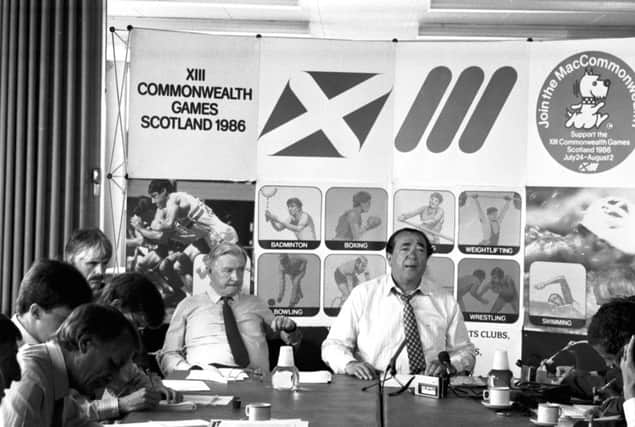Edinburgh’s costly farce saved Commonwealth Games


At least that’s the black-and-white picture, and in its essentials it remains correct. More nations boycotted than took part; far from being saved by the media tycoon, as he boasted, the Games ended up losing millions; and the weather was dismal.
But there is a question that is often forgotten in accounts of the 1986 Games; one which paints a more varied picture. What was the alternative?
Advertisement
Hide AdAdvertisement
Hide AdIf Edinburgh had not bid to hold the Games for a second time, where would they have been held instead? If the boycott had persuaded the organisers to call the event off, would the Games really have resumed four years later? Or would the 12th Commonwealth Games, held in Brisbane in 1982, have turned out to be the last?
Louise Martin, for one, is convinced that it is only thanks to Edinburgh 1986, flaws and all, that we are about to celebrate Glasgow 2014.
Honorary secretary of the Commonwealth Games Federation, the world governing body for the event, Martin is also vice-chair of the organising committee for this year’s Games. As the new secretary of Scottish Gymnastics, Martin was appointed to the council of Commonwealth Games Scotland shortly before the Games. But her sport was not part of the Games, so her involvement was minimal and she has no axe to grind. But she is utterly convinced that Edinburgh 1986, for all its faults, was a necessary and noble sacrifice.
“Nobody has anything negative to say about 1970: 1986 was completely different,” she recalled. “It was troubled from the point of view that Scotland stepped in to save the Games, because there was nobody willing to take the Games.
“Trouble was starting to build up. So Scotland said we would do it, because we had already done it and the facilities were largely there anyway.
“In hindsight it was too soon, but we saved the Games. If we hadn’t had the Games, I don’t think anybody after that would have gone for them. I think everybody would have said, ‘Well, that’s it’.”
Glasgow had considered mounting a rival bid to Edinburgh’s, and Kenya, Northern Ireland and Trinidad had also expressed an early interest in succeeding Kingston as hosts. But by the time the Federation authorities gathered at the Moscow Games in 1980 to make a decision, the Scottish capital was the only place willing to take the responsibility to hold the event.
Sporting disputes over apartheid had been going on for some time, with the New Zealand rugby team’s tour to South Africa being a particular source of grievance. By 1986, the Thatcher government’s friendliness towards the racist regime had further soured relations between the so-called white and black countries in the Commonwealth. And what made matters tougher for the Edinburgh organisers was the refusal by the government to offer any financial backing.
Advertisement
Hide AdAdvertisement
Hide Ad“We said we’d do it, we’d try and get the funding,” Martin continued. “Then we didn’t get any funding from the Westminster government and the rest is history with Maxwell stepping in and things like that.
“Our biggest problem was lack of funding. With the benefit of hindsight, would we have still gone for the Games if we’d known? I don’t know the answer to that, but probably not. Then where would we be today? So it’s probably just as well we didn’t know what was going to happen.
“The regional games like the Pan-Ams were all growing at that time. So we needed to keep the Commonwealth Games. There were a number who asked if it was worth it, but if you see where we are now and where we’re going, I think it’s definitely worth it. If we hadn’t gone ahead in 1986, I’m fully convinced we wouldn’t be sitting here today looking forward to Glasgow.”
While the boycott reduced the number of competitors and the government’s lack of monetary assistance was a serious problem, organisational ineptitude often played a part as well. The popular image of Edinburgh 1986 was that this was 1970 part two, with the same main venues being used, but the world had moved on. Everyone expected higher standards, everything cost more, and one of the biggest sporting events in the world could no longer be run on a combination of wishes and promises.
In The Past Is A Foreign Country, their newly-published history of Scottish athletics, Colin Shields and Arnold Black use one small but essential aspect of the two Games to show how much things had changed. “Security had been a low priority at the 1970 Games, with the main cost of the security budget being £2,500 for the deployment of 30 guards to patrol the ‘chastity fence’ which split the men’s and women’s sections of the Games Village.
“Things changed drastically after the terrorist attack at the 1972 Olympics. In 1986 a major security firm was engaged at a cost of more than £500,000 to provide over 200 guards with the latest electronic equipment.”
With similarly spiralling costs in other areas, the Edinburgh Games may well have been doomed to financial failure from the start. Thankfully, the organisers themselves did not share that analysis.